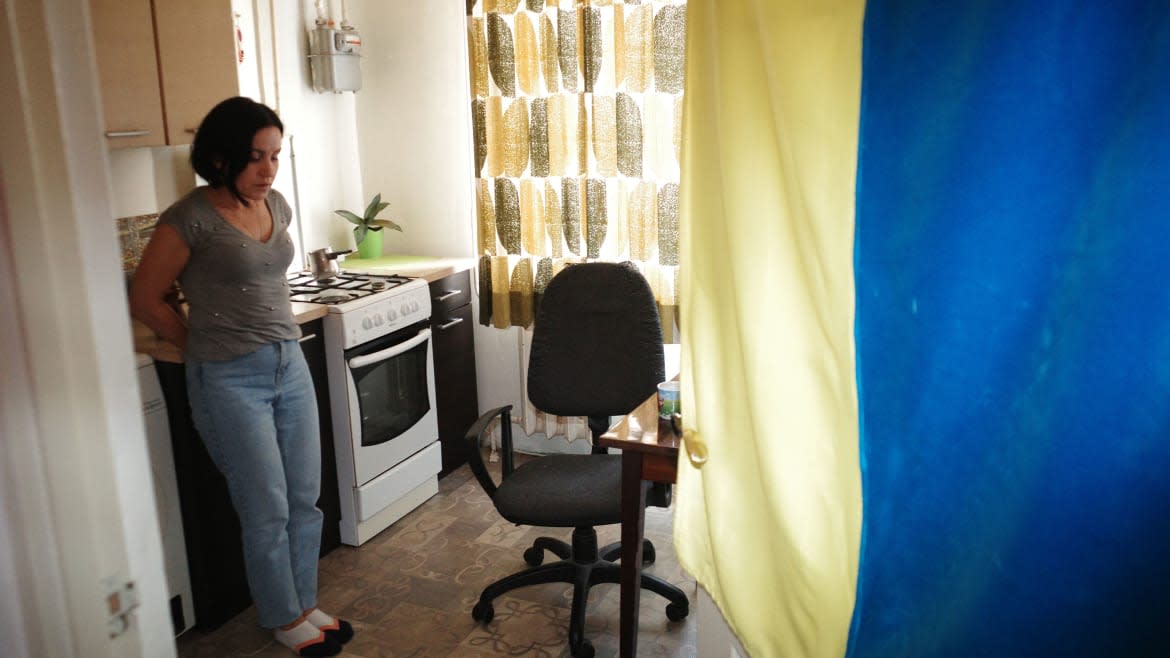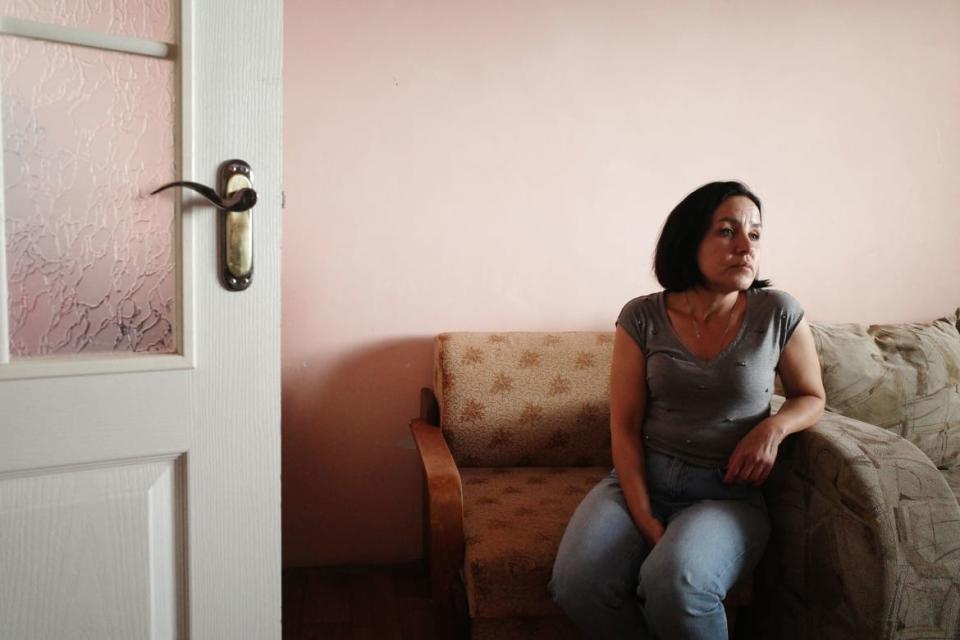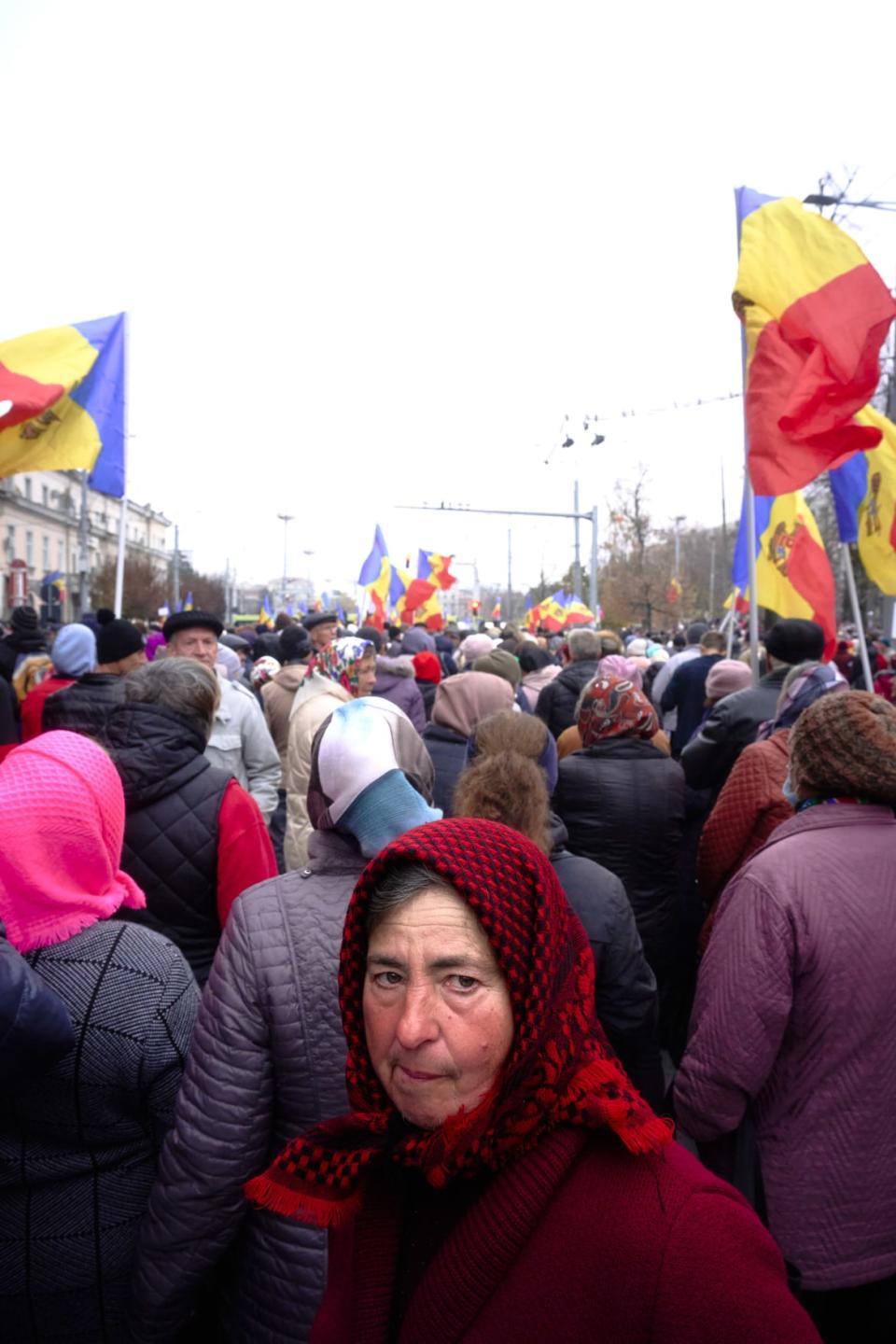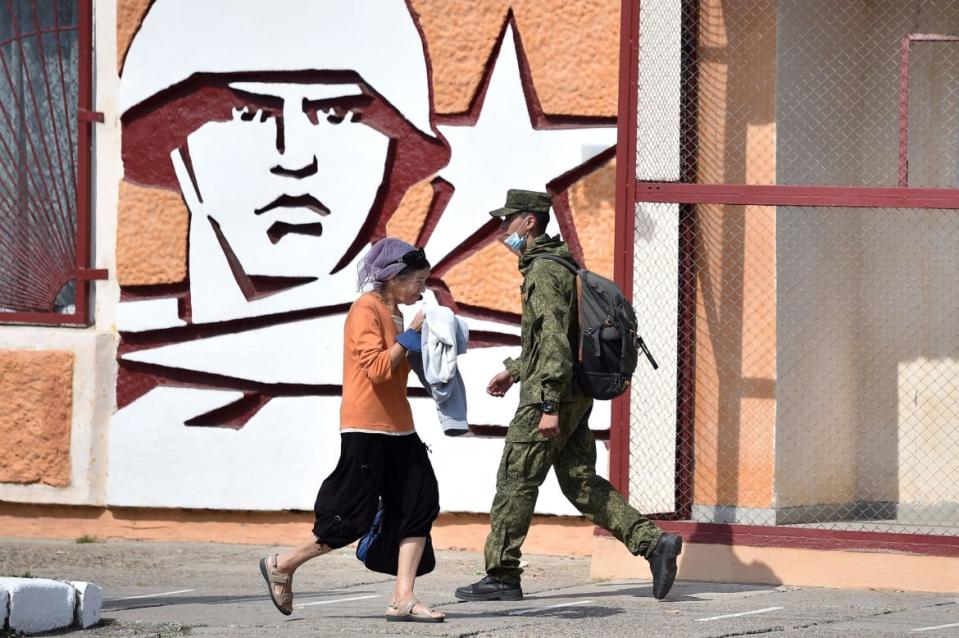Putin’s First War Victims Outside Ukraine Reveal Tragic Secrets

TIRASPOL, Moldova—Victor Plescanov, a 59-year-old gravedigger from Tiraspol—the capital of the Russian-backed breakaway region of Transnistria in Moldova—has never shied away from bold public expressions of support for Ukraine’s independence.
A week after Russia's invasion of Ukraine in February last year, Plescanov was in a fabrics store running an errand. When he noticed only Transnistrian and Russian flags at the store, he boldly asked the local who worked there for fabrics to make a Ukrainian flag. At home, he hung the self-made flag outside their apartment, a bold gesture given their neighbors were members of the Transnistria proxy for the FSB, Russia’s federal security agency.
Plescanov, who lived with his wife and teenage son at the time, knew such gestures came with risks. In a region where Russian influence is predominant and any opposition narrative is suppressed, Victor's actions—like questioning the absence of a Ukrainian flag, and then hanging one outside his apartment—were viewed as dissent. What he couldn’t have known was that his actions that day would ultimately lead to a lengthy prison sentence—and force his wife, Oxana Lopusneak, and their 14-year-old, into a life of fear.
“The police and KGB, they always wanted to catch him for something,” Lopusneak told The Daily Beast in a March interview from their family’s apartment in Tiraspol. “This I knew for sure.”

Oxana in her family apartment in Tiraspol.
Knock at the Door
A week after her husband hung the Ukrainian flag outside his window, two police officers arrived outside their door and took Plescanov to a local police station. Plescanov was allegedly questioned at gunpoint by a Russian peacekeeper and eventually released from police custody pending a court date. He went home and continued expressing his support on social media for Ukraine as the war seemed to draw closer.
It was spring 2022 and Transnistria and Moldova were both sweating the invasion next door. For the next several months, those deemed to be agitators, like Plescanov, were silenced or barred entry to Moldova proper. When authorities in either part of the country were unable to silence the opposition, they sought to drown out the loudest voices.
Hipster Art Couple Unmasked in Putin’s Secret ‘Next Ukraine’ Mission
Despite his initial release, Plescanov wasn’t out of the woods yet. On June 10, another set of police officers came knocking on the family’s door to tell Plescanov that he was due in court later that afternoon.
Lopusneak said she knew something was wrong by the expression of one, but Plescanov received the news in his usually puerile buoyancy. As a gravedigger, he often faced the problems of the living as comical. He donned a pair of shorts emblazoned with marijuana leafs and put on an American flag shirt. Lopusneak stayed home preparing dinner for the family.
“It was like a dream,” Lopusneak told The Daily Beast. “We were so stressed during this time. We worried about Ukraine, we didn’t sleep.”
When the dinner was ready she called the court house. Plescanov had received a five-day sentence, but the court would not disclose the charges. The next morning, a squad of police officers raided their apartment shortly after 6 a.m. local time. They said they were searching for weapons. During the search, they told Lopusneak that her husband would be detained for an additional five days, and that she could retrieve him from jail then. After a five-hour search of her apartment and a room Plescanov was renovating in a nearby building, the officers left.
On the tenth day after his appearance in court, Lopusneak went to the courthouse, then the police station. When she asked the desk sergeant, and later the lieutenant, where Plescanov was, their faces grew pallid. They told her to wait—she’d have to speak with someone from the KGB.
Lopusneak had heard stories about what might happen if she agreed to meet with them. She and Plescanov had already been interrogated once before and they had seen the type of intimidation at play: armed men in a small windowless room, seeking a coerced confession.
One representative on her legal team warned her that the KGB wanted to speak with her further, “to take you to the forest. They will slap you a little bit and make you scared.”
“I’m a woman,” Lopusneak said. “I don’t want to feel that fear.”
Later that day, she met with the KGB at the regional offices in Tiraspol and they questioned her about her relationship with her husband, and why they had chosen to send their son to a Romanian school and not a Russian school. One man entered and prepared to take a statement, placing a notebook between them. She refused to speak or sign anything. They said goodbye and let her leave, without offering any clarity on Plescanov’s fate or whereabouts.
Practice Run
Transnistria came briefly to global attention last March when Belarusian President Alexander Lukashenko unveiled a map appearing to show Russian forces anticipating an attack in the breakaway Transnistrian region, home to a Soviet-era ammunition cache. The protests grew throughout the year as provocations like Lukashenko’s continued.

Protest in Moldova last November.
Moldova as a whole has been a target of Russian disinformation campaigns for years, often serving as a test-bed for tactics later deployed by the Kremlin in places like Mali, Venezuela, and the U.S., according to experts. The ethnic tensions, sporadic efforts to defend ethnic Moldovans, and an absence of stable governance have all played into Moldova's susceptibility to external meddling, especially from Russia.
Russia’s Covert Operation for ‘the Next Ukraine’ Has Already Begun
The story of Lopusneak and Plescanov has offered a rare public glimpse of how Kremlin-backed Transnistria operates since the invasion brought a renewed conflict to its border.
“Pleșcanov’s conviction is extremely similar to the suppression of war critics in Russia proper,” Vlad Lupan, a former Moldovan ambassador to the U.N., told The Daily Beast after Pleșcanov’s arrest last year.
Untouchable
When The Daily Beast visited Tiraspol in March, there were signs of what appeared to be a political identity crisis splattered across the region—a desire to be both a Russian satellite state and a nation embraced by the rest of Europe. At one edge of the city was the “Back in the U.S.S.R.” cafe; at another edge the “Dolce Vita” restaurant.
Reaching the family’s apartment in Tiraspol required a trek across an open field, and a squeeze through a concrete crack between two towering buildings which emerged into a windswept courtyard filled with the mews of children at a playground. At the stairs leading to the apartment, a graying man in Russian military fatigues smoked a cigarette, his blouse unbuttoned at the belly.
At her home, Lopusneak expressed both fear and resignation over her future. She looked out the window and pointed to where Plescanov’s Ukrainian flag once flew—where her husband no longer stood.
After searching for two weeks at jails across Transnistria, sending petitions to the local police forces, she said she eventually found Plescanov in the basement of a jailhouse in Slobodzheya. “Of course he was crying that time when we came to the jail… He was very upset about this," Lopusneak said. In September, he was sentenced to three years and four months in prison, the charges still sealed.

A soldier and a woman walk past the headquarters of the Operative Group of the Russian Troops in the town of Tiraspol, the capital of Transnistria - Moldova's pro-Russian breakaway region on the eastern border with Ukraine.
Lopusneak’s biggest fear then was Plescanov’s health issues. He was treated for depression before his arrest—he had reportedly attempted suicide in prison—and had lasting complications from a cholecystectomy. That was second only to the fear that she would be next. Under Transnistria law, she could be arrested for having contacted Moldova’s central government for assistance on her husband’s case once her son turned 14, when the state believed the teenager would be old enough to care for himself without his father or mother.
“There is a law here. Until a child turns 14, they cannot touch the mother. When my son turns 14, they can do the same as Victor,” she said.
In her apartment, Lopusneak read the letter she had received from the State Chancellery of the Republic of Moldova after she requested their help. Although Transnistria is internationally recognized as part of Moldova, “The office of Maia Sandu, they told me they don’t want Transnistria,” Lopusneak said, referring to the president of Moldova, a vocal critic of Russian influence in the country. “But they don’t want to touch it either, because they don’t know what to do with these people. How can you change the people’s mind, their brains, to think of reintegrating with Moldova, to the European Union?”
She was angered by the helplessness of the situation. “You have to change their mind,” she said of Transnistria’s people. “Here, the propaganda spoils their brain.”
Lopusneak also expressed worry for her teenager. In the last two years, young people in the region have faced increased pressure to suppress their dissent, whether indirect, through association, or through action. In at least one case in Transnistria, a teenage girl wearing a ribbon in support of Ukraine was detained and questioned by security forces.
Fantasy Land
Nikolai Kuzmin, who is on Plescanov’s defense team as part of the civil society activism group Apriori, said he sees the tactics that have been used against the gravedigger in other cases targeting dissenters in the region.
“[Transnistria authorities] imprison a person for something small and for a short time, quickly collect a criminal case, and start it while continuing to hold the person in custody. Personally, it seems to me that, if possible, the Transnistria authorities will continue to use this scheme.”
Kuzmin said he has petitioned the Transnistria government for clarity over what Plescanov was being charged with, but has received only silence. Inside Transnistria, some residents who spoke with The Daily Beast figured Plescanov had received the treatment that he deserved. Few felt that human rights and freedom of speech were being limited. “It seems to me that when verified information is scarce,” Kuzmin said, “people turn to fantasy.”
Although she remains worried that she will face a similar fate as her husband’s, Lopusneak remains outspoken against the treatment of Plescanov by Transnistrian authorities. Her husband, after all, had been outspoken, too, despite his case becoming lost in the morass of falsehoods and indifferences of the Russian state.
In Lopusneak’s view, the entire episode of Plescanov's sentencing was triggered not by the Ukrainian flags her husband displayed, nor the tense exchange in the fabrics store. His fate, she believes, was sealed by a single social media post Plescanov wrote at the start of war. It read, in part, “Slava Ukraini.” Glory to Ukraine.
Get the Daily Beast's biggest scoops and scandals delivered right to your inbox. Sign up now.
Stay informed and gain unlimited access to the Daily Beast's unmatched reporting. Subscribe now.

